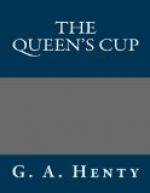“You know what I have come for, Miss Greendale,” he began at once. “I think that you know how I feel towards you, and how deeply I love you. I have come to ask you to be my wife.”
“Before I answer you, Mr. Carthew,” she said, calmly, “I must ask you to listen to a story. It was told me here two days ago by a man named George Lechmere. Do you know him?”
“I seem to have heard his name, though I cannot say where,” he replied, surprised at the coolness with which she spoke.
“He is a farmer’s son, I believe, and he was an interested party, though not the chief actor of the story. The chief actor, I suppose I should say actress, was Martha Bennett. You know her?”
Carthew stepped back as if he had received a sudden blow. His face paled, and he gave a short gasp.
“I see you know her,” she went on. “She was a poor creature, I fancy, and her story is one that has often been told before. She threw away the love of an honest man, and trusted herself to a villain. He betrayed the trust, took her away to America and then cast her off, and she went home to die. Her destroyer did not altogether escape punishment. He was attacked and pelted by her father and his friends in the market place at Chippenham. You see, it all happened in my neighbourhood, and the villain, not daring to show his face in the county again, disposed of his estate.”
“You don’t believe this infamous lie?” Carthew said hoarsely.
“How do you know that it is an infamous lie, Mr. Carthew? I have mentioned no names. I have simply told you the story of a hapless girl, whom you once knew. Your face is the best witness that I can require of its truth. Thank God I heard it in time. Had it not been for that I might have been fool enough to have given you the answer you wanted, for I own that I liked you. I am sure now that I did not love you, for had I done so, I should not have believed this tale; or if I had believed it, it would have crushed me. But I liked you. I found you pleasanter than other men, and I even fancied that I loved you. Had I not known this story, I might have married you, and been the most miserable woman alive, for a man who could play the villain to a hapless girl, who could stoop to so mean and dastardly an action as to cripple a rival yacht, is a creature so mean, so detestable, that wretched indeed would be the fate of the woman that married him.
“Do not contradict it, sir,” she said, rising from her seat now with her face ablaze with indignation. “I was watching you. I had heard that story, and had heard another story of how the boat of an antagonist of yours at Henley had been crippled before a race, and I watched you from the time I came on board. I saw that you were strangely confident; I saw how you were watching for something; I saw the flash of triumph in your face when that something happened; and I was absolutely certain that the same base manoeuvre that had won you your heat at Henley had been repeated in your race for the Queen’s Cup.




